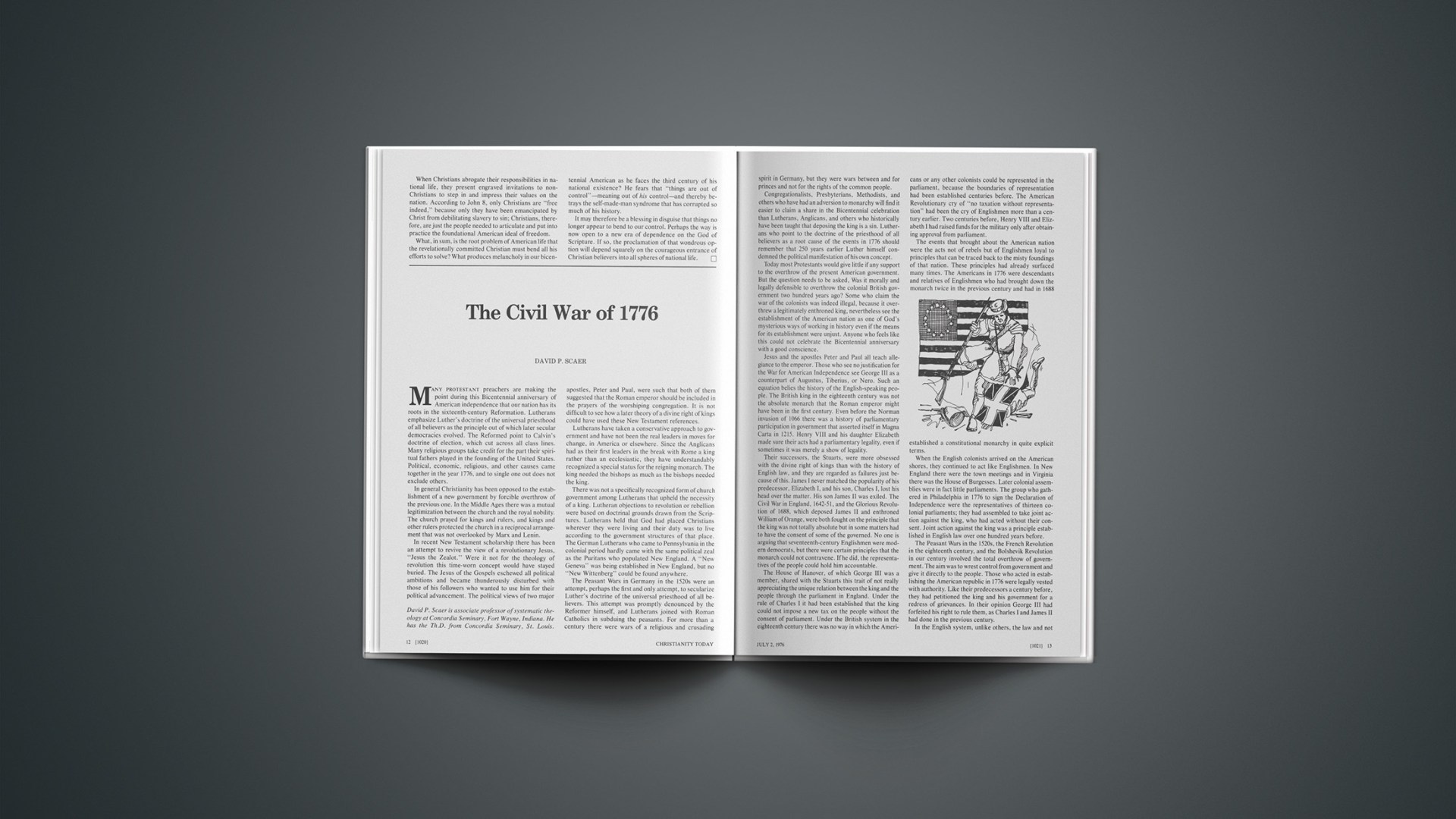Many Protestant preachers are making the point during this Bicentennial anniversary of American independence that our nation has its roots in the sixteenth-century Reformation. Lutherans emphasize Luther’s doctrine of the universal priesthood of all believers as the principle out of which later secular democracies evolved. The Reformed point to Calvin’s doctrine of election, which cut across all class lines. Many religious groups take credit for the part their spiritual fathers played in the founding of the United States. Political, economic, religious, and other causes came together in the year 1776, and to single one out does not exclude others.
In general Christianity has been opposed to the establishment of a new government by forcible overthrow of the previous one. In the Middle Ages there was a mutual legitimization between the church and the royal nobility. The church prayed for kings and rulers, and kings and other rulers protected the church in a reciprocal arrangement that was not overlooked by Marx and Lenin.
In recent New Testament scholarship there has been an attempt to revive the view of a revolutionary Jesus, “Jesus the Zealot.” Were it not for the theology of revolution this time-worn concept would have stayed buried. The Jesus of the Gospels eschewed all political ambitions and became thunderously disturbed with those of his followers who wanted to use him for their political advancement. The political views of two major apostles, Peter and Paul, were such that both of them suggested that the Roman emperor should be included in the prayers of the worshiping congregation. It is not difficult to see how a later theory of a divine right of kings could have used these New Testament references.
Lutherans have taken a conservative approach to government and have not been the real leaders in moves for change, in America or elsewhere. Since the Anglicans had as their first leaders in the break with Rome a king rather than an ecclesiastic, they have understandably recognized a special status for the reigning monarch. The king needed the bishops as much as the bishops needed the king.
There was not a specifically recognized form of church government among Lutherans that upheld the necessity of a king. Lutheran objections to revolution or rebellion were based on doctrinal grounds drawn from the Scriptures. Lutherans held that God had placed Christians wherever they were living and their duty was to live according to the government structures of that place. The German Lutherans who came to Pennsylvania in the colonial period hardly came with the same political zeal as the Puritans who populated New England. A “New Geneva” was being established in New England, but no “New Wittenberg” could be found anywhere.
The Peasant Wars in Germany in the 1520s were an attempt, perhaps the first and only attempt, to secularize Luther’s doctrine of the universal priesthood of all believers. This attempt was promptly denounced by the Reformer himself, and Lutherans joined with Roman Catholics in subduing the peasants. For more than a century there were wars of a religious and crusading spirit in Germany, but they were wars between and for princes and not for the rights of the common people.
Congregationalists, Presbyterians, Methodists, and others who have had an adversion to monarchy will find it easier to claim a share in the Bicentennial celebration than Lutherans, Anglicans, and others who historically have been taught that deposing the king is a sin. Lutherans who point to the doctrine of the priesthood of all believers as a root cause of the events in 1776 should remember that 250 years earlier Luther himself condemned the political manifestation of his own concept.
Today most Protestants would give little if any support to the overthrow of the present American government. But the question needs to be asked, Was it morally and legally defensible to overthrow the colonial British government two hundred years ago? Some who claim the war of the colonists was indeed illegal, because it overthrew a legitimately enthroned king, nevertheless see the establishment of the American nation as one of God’s mysterious ways of working in history even if the means for its establishment were unjust. Anyone who feels like this could not celebrate the Bicentennial anniversary with a good conscience.
Jesus and the apostles Peter and Paul all teach allegiance to the emperor. Those who see no justification for the War for American Independence see George III as a counterpart of Augustus, Tiberius, or Nero. Such an equation belies the history of the English-speaking people. The British king in the eighteenth century was not the absolute monarch that the Roman emperor might have been in the first century. Even before the Norman invasion of 1066 there was a history of parliamentary participation in government that asserted itself in Magna Carta in 1215. Henry VIII and his daughter Elizabeth made sure their acts had a parliamentary legality, even if sometimes it was merely a show of legality.
Their successors, the Stuarts, were more obsessed with the divine right of kings than with the history of English law, and they are regarded as failures just because of this. James I never matched the popularity of his predecessor, Elizabeth I, and his son, Charles I, lost his head over the matter. His son James II was exiled. The Civil War in England, 1642–51, and the Glorious Revolution of 1688, which deposed James II and enthroned William of Orange, were both fought on the principle that the king was not totally absolute but in some matters had to have the consent of some of the governed. No one is arguing that seventeenth-century Englishmen were modern democrats, but there were certain principles that the monarch could not contravene. If he did, the representatives of the people could hold him accountable.
The House of Hanover, of which George III was a member, shared with the Stuarts this trait of not really appreciating the unique relation between the king and the people through the parliament in England. Under the rule of Charles I it had been established that the king could not impose a new tax on the people without the consent of parliament. Under the British system in the eighteenth century there was no way in which the Americans or any other colonists could be represented in the parliament, because the boundaries of representation had been established centuries before. The American Revolutionary cry of “no taxation without representation” had been the cry of Englishmen more than a century earlier. Two centuries before, Henry VIII and Elizabeth I had raised funds for the military only after obtaining approval from parliament.
The events that brought about the American nation were the acts not of rebels but of Englishmen loyal to principles that can be traced back to the misty foundings of that nation. These principles had already surfaced many times. The Americans in 1776 were descendants and relatives of Englishmen who had brought down the monarch twice in the previous century and had in 1688 established a constitutional monarchy in quite explicit terms.
When the English colonists arrived on the American shores, they continued to act like Englishmen. In New England there were the town meetings and in Virginia there was the House of Burgesses. Later colonial assemblies were in fact little parliaments. The group who gathered in Philadelphia in 1776 to sign the Declaration of Independence were the representatives of thirteen colonial parliaments; they had assembled to take joint action against the king, who had acted without their consent. Joint action against the king was a principle established in English law over one hundred years before.
The Peasant Wars in the 1520s, the French Revolution in the eighteenth century, and the Bolshevik Revolution in our century involved the total overthrow of government. The aim was to wrest control from government and give it directly to the people. Those who acted in establishing the American republic in 1776 were legally vested with authority. Like their predecessors a century before, they had petitioned the king and his government for a redress of grievances. In their opinion George III had forfeited his right to rule them, as Charles I and James II had done in the previous century.
In the English system, unlike others, the law and not the king is ultimately supreme. Christians living under this kind of a system really “honor the king” by upholding the entire system under which they are ruled and not by giving blind loyalty to a person who is called king or emperor or leader. In other systems a more personal loyalty might be required.
The American experience of 1776 belongs not to the popular uprisings so common throughout the world but to the natural development of English law. The War for American Independence was a civil war, with both the British and the Americans fighting for English ideals. For the British it was the supremacy of the English king, and for the Americans it was the supremacy of English principles. The subsequent establishment of independent nations within the British Commonwealth of Nations shows that the British later recognized as valid the principles for which the Americans fought. In the case of the Canadians, the New Zealanders, and the Australians, the mother country recognized the inherent rights of her English children before they had to assert them with the same emphasis that the Americans did.
As long as Christians are not required to act against their sense of morality, they are going to be loyal subjects of the emperor as required by the New Testament. In 1776, the “emperor” for Englishmen was not the person of the king but the principles of English law. The Declaration of Independence was not a statement of rebellion but a statement of the rights of free Englishmen. With this attitude, every Christian can celebrate the Bicentennial year with a good conscience.










